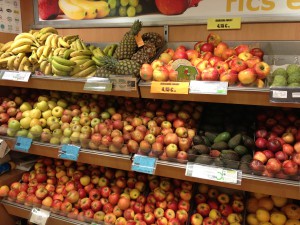ORGANIC VS. CONVENTIONALLY GROWN FOOD
Written by Mandy Keillor, Author, Advocate and Entrepreneur
Recent documentary films such as Food Inc. and Hungry for Change have helped draw widespread attention to what we really are putting into our bodies vs what we should be. And although it is a personal choice, I really believe that there is now enough compelling evidence, despite what governments, industries and some in the scientific community say, to suggest that organic is indeed best for the body, the environment and the future of human beings.
There is often a lot of confusion about whether we should eat organically grown food over food produced en masse using pesticides, as is today’s conventional growing method. In the true spirit of Studio Australia Barcelona, we want to empower you with the resources to make up your own mind and be responsible for your own health and wellness.
So, firstly, let’s define ORGANIC…
These are foods that are produced without the use of pesticides, chemical fertilizers, food additives and without any genetic modification*. Essentially it is the food as nature intended it. In places such as the USA, Canada, Japan, Australia and the EU producers are required to obtain special certification to market their food as organic within their borders.
*Genetic modification is the altering of a plant or animal’s DNA. They are called GMO’s or Genetically Modified Organisms. There has been no long term testing on the impact these products may have on humans, animals and the environment.
Other descriptions you might see in the market place are ‘all natural’, ‘hormone free’, ‘grass fed’ or ‘free range’ but these do not fit the definition of organic.
Conventional vs. ORGANIC
A popular and respected 2012 study from Stanford University, http://med.stanford.edu/ism/2012/september/organic.html, suggested that there is no ‘strong evidence that organic foods are more nutritious, or carry fewer health risks than conventional alternatives, though consumption of organic foods can reduce the risk of pesticide exposure.’
The study’s conclusion, as is often the case, was that ultimately more studies need to be done! Personally, the notion that organic foods do reduce the risks of pesticide exposure is enough of a reason for me. It might seem like an obvious stance for a detox author to have concerns about slow poisoning, but the one thing writing my book and my professional life as a health and wellness practitioner in the past 7 years has exposed me to, is about what certain chemicals do to our bodies. By default of modern living we are all putting our bodies under pressure. Although globally we are living longer that is a result of technology, medical innovation and advancements, I think you have to wonder why the increase in so many diseases and allergies (chronic and life threatening), especially in children, why are infertility rates rising independent of age group? It poses the questions how can we help ourselves and arm ourselves with knowledge to live well.
The pros: Why we recommend ORGANIC?
Personally we prefer to buy and eat organic food when we can and recommend the same to our clients for the following reasons:
- It tastes better generally because it is fresher.
- It is not irradiated. Meaning that it is not treated with radiation to kill bacteria and make the food stay fresh longer
- It is seasonal and is often locally grown so supports local economy.
- It is not produced with toxic chemicals.
- It is not genetically modified.
- It is better for the environment – no chemicals leaching into the soil or water supplies.
- Animals organically grown are treated more humanely.
- Production is harmonious with nature.
- Is healthier for those people producing the food as they are not regularly exposed to dangerous herbicides and pesticides.
What are the cons of ORGANIC?
- Price
One of the most common concerns of our clients is how expensive organic food is compared to conventionally grown food. For sure, organic can sometimes be two or three times as much as what you can buy in the supermarket. This is because it is labor intensive to produce, expensive to certify as an organic status, most farms do not qualify for Government subsidies, the organic feed for animals is more costly and the farms are generally smaller so they have less volume to spread running costs.
Several ways to reduce the cost of eating organic:
– Shop at farmers markets or local markets.
– Buy from the farm – in Barcelona you can order from Dr Veg www.doctorveg.es 5kg, 8kg and 12kg boxes of local organic produce. They deliver to your home and can also bring your bread, eggs and olive oil!
– Buy in season and shop around.
- Spoiling
It may spoil quicker than conventional produce due to the fact that it does not contain artificial preservatives or is not irradiated…mmm…. is this a con when you think about it?
- Healthier
Despite organic foods not being exposed to pesticides there is no evidence to date concluding that organic is healthier or more nutritious than conventionally grown foods.
- Chemicals
Organic food is not completely chemical free as people often believe.
So, at the end of the day it really comes down to you! We look forward to hearing what you choose and why.
Here are some great documentaries on the subject to help you decide! Enjoy!
Forks over Knives
Hungry for Change
Genetic Roulette
Food Inc.
Sources:
http://www.realbuzz.com/articles/the-pros-and-cons-of-organic-food-gb-en/
http://www.helpguide.org/life/organic_foods_pesticides_gmo.htm
http://ecoscraps.com/13-benefits-organic-food/
http://www.macmillandictionary.com/thesaurus/british/irradiate#irradiate_4



March 11th, 2013 → 1:27 pm @ mandydetox
0